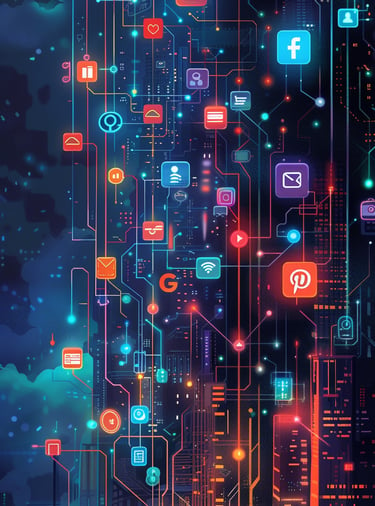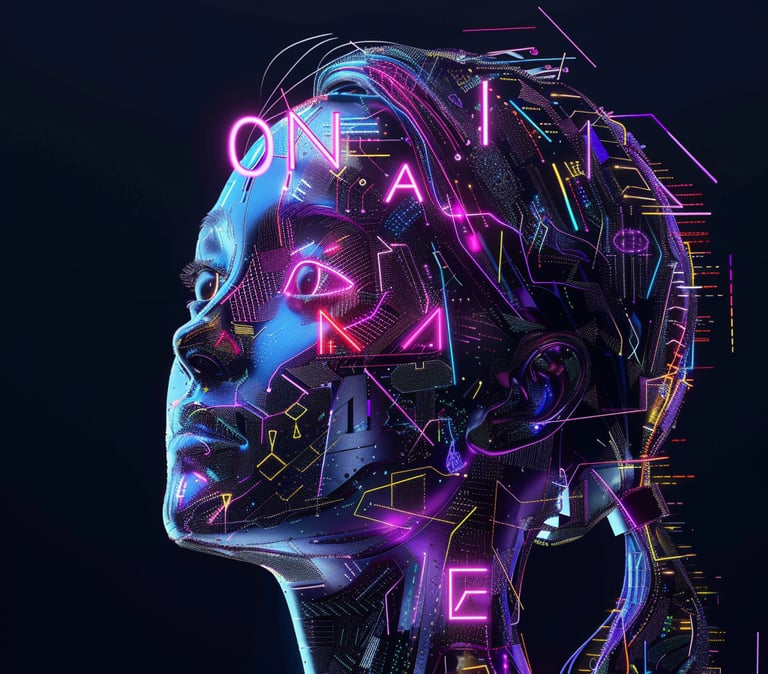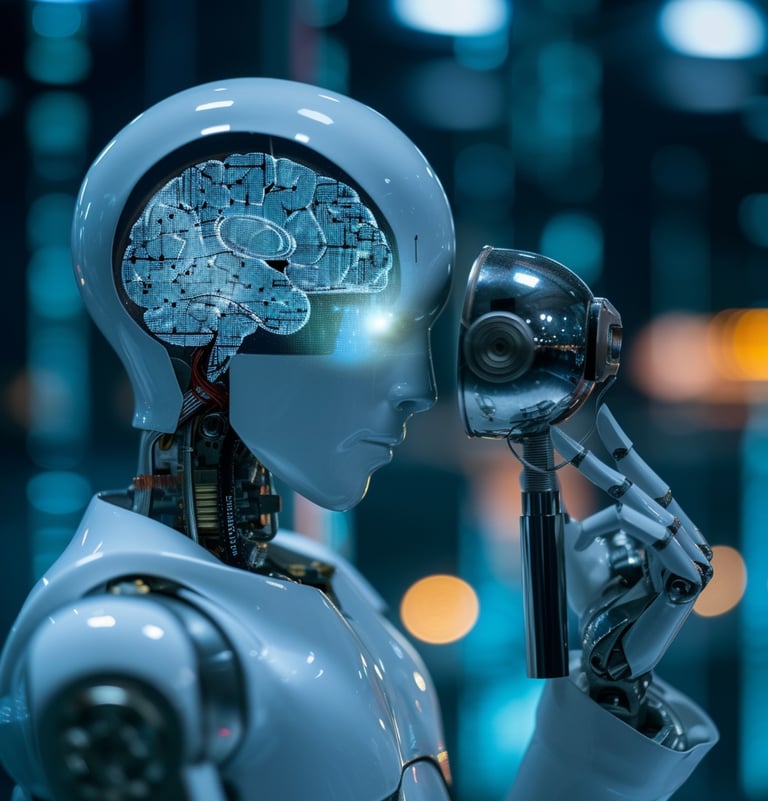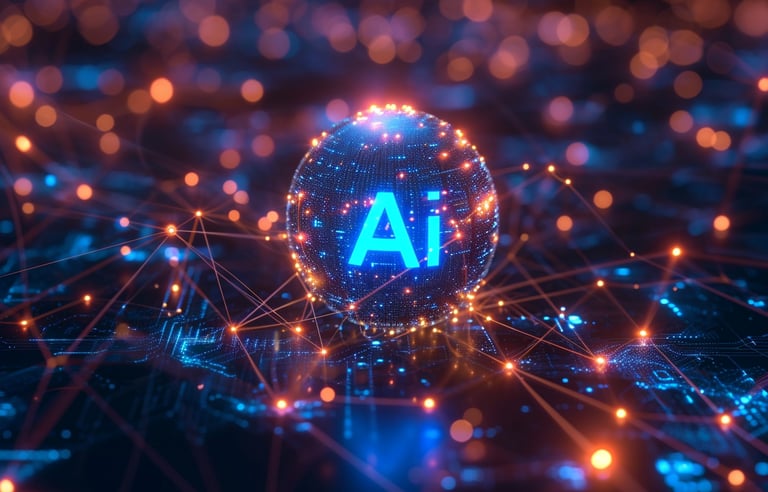
The Role of Artificial Intelligence in Digital Marketing
Explore the transformative power of AI in marketing with our in-depth analysis. Discover how AI technologies like machine learning, predictive analytics, and natural language processing are revolutionizing marketing strategies, personalization, and customer engagement. Learn about the future trends of AI-driven marketing and real-world success stories. This guide is essential for marketers looking to leverage AI to enhance their campaigns and achieve unparalleled results. Dive into the future of marketing with AI today.
ARTIFICIAL INTELLIGENCE
Bashaar Ahmed
2/24/202415 min read
AI in Marketing: Transforming Strategies with Technology
Artificial Intelligence (AI) has ushered in an era of innovation and transformation in numerous industries, and one area it has significantly impacted is marketing. Understanding and adapting to ever-changing consumer behavior has been a long-standing challenge for marketers. Conventional methods of market analysis and strategy-making are inefficient at comprehending intricate behavioral patterns and quick shifts in preferences. Here, Artificial Intelligence in marketing presents immense potential. By leveraging insightful data collected through various AI-enabled tools, marketers can develop better marketing strategies, making them more precise and customer-centric.
Technological advancements have given Artificial Intelligence the ability to revolutionize the way marketing functions today. A critical aspect is that it can provide unprecedented insights into consumer behavior. By making sense of large volumes of data, AI can identify trends and patterns that were previously unnoticed, enabling businesses to understand their customers more profoundly. It can efficiently identify what customers are keen on, what drives their buying decisions, and how they interact with brands. Such valuable insights empower businesses to create personalized marketing strategies that can make them stand out in the competitive marketplace. The role of AI in marketing strategy transformation indeed holds a promising future.


Introduction to AI in Marketing
Artificial Intelligence (AI) is increasingly becoming a fundamental part of modern marketing and business landscapes. Leveraging the power of AI algorithms and machine learning processes, companies are continually exploring innovative ways to enhance their marketing tactics. Marketing Artificial Intelligence technologies, a subset of AI, specifically focuses on augmenting marketing strategies by bridging the gap between data science and marketing, hence providing marketers with deeper insights for strategic decision-making.
With the evolution of AI technology, the dynamics of the marketing domain have also changed profoundly. Marketing Artificial Intelligence technologies offer capabilities, such as predictive analytics, customer segmentation, and campaign automation, which can potentially elevate the efficiency and effectiveness of marketing strategies. It shapes the future of marketing by delivering tailored customer experiences, enhancing engagement metrics, and optimizing brand communication across multiple platforms.
What Is AI in Marketing?
AI, or Artificial Intelligence, in marketing is a transformative technology that utilizes advanced algorithms and machine learning capabilities to streamline and improve various marketing tasks and operations. It essentially equips marketing systems with the ability to augment human abilities and to process vast amounts of data, perform predictive analysis, make informed recommendations, and automate repetitive tasks. This computing technology can improvise the efficiency, precision, and result-oriented actions in marketing.
AI-driven marketing strategies intensely augment traditional marketing procedures by offering powerful insights, personalization, and predictive marketing abilities. AI in marketing covers extensive areas ranging from customer segment analysis to real-time decision making, content creation, email marketing, customer relationship management and advertisements. As a result, AI brings about dynamic, subtle changes in the marketing landscape, inducing a paradigm shift towards efficient, fast-paced, and data-centric marketing operations. With the utilization of AI, organizations can not only achieve increased revenue but also deliver superior customer experiences.
The Rise of AI: A Brief History and Its Impact on Marketing
AI, or artificial intelligence, is far from being a recent development. Its roots can be traced back to the 1950s, when the concept of 'machine intelligence' was first introduced. However, over the past decade, with the advancements in technology and data processing capabilities, AI has experienced an accelerated growth and wider application across different industries. In the realm of marketing, AI has been instrumental in shifting traditional practices towards a more data-driven approach.
Artificial Intelligence Personalization in Marketing has considerably reshaped the marketing landscape, paving the way for more targeted and personalized strategies. For instance, AI-powered algorithms can now process vast amounts of data to understand consumer behavior, preferences, and predict future trends. This valuable insight enables marketers to create personalized customer experiences, leading to increased customer engagement and enhancing overall business performance. AI has undoubtedly rewritten the rules of marketing, setting new benchmarks for efficiency and effectiveness.
Key AI Technologies Revolutionizing Marketing
The landscape of marketing is currently witnessing a dramatic transformation, largely propelled by the integration of Artificial Intelligence (AI). The future of Artificial Intelligence in marketing is bright, with an array of innovative technologies that are set to revolutionize traditional strategies. These AI technologies not only equip marketers with a variety of tools for capturing customer data, but they also enable real-time response and personalization, thereby setting a high precedence for the potential that AI holds for the marketing industry.
One such technology that is taking the marketing industry by storm is Machine Learning (ML). AI-based machine learning models can be programmed to anticipate customer behavior by analyzing user data, thus allowing organizations to predict trends and hone their marketing strategies accordingly. Moreover, Natural Language Processing (NLP) has significantly enhanced customer interactions, providing intuitive chatbots that offer personalized and immediate responses to customer queries. Furthermore, the application of AI-based computer vision transforms social media and retail marketing strategies, opening vast opportunities for brand promotion. Thus, these breakthroughs echo the promising future of Artificial Intelligence in marketing.


Machine Learning and Predictive Analytics
At the heart of advancements in digital marketing lies Machine Learning (ML) and Predictive Analytics. ML is all about teaching computers how to learn patterns and make predictions based on existing data, while Predictive Analytics utilizes these patterns to forecast future outcomes. Together, these tools give marketers the power to anticipate customer behavior, track trends, and make data-driven decisions
For instance, an ecommerce platform can employ ML algorithms to analyze a customer's browsing history and buying habits. This information feeds into Predictive Analytics models that can forecast the kind of products the customer might be interested in, resulting in personalized product recommendations. Similarly, Predictive Analytics can help marketers anticipate churn rates, advertising performance, and even the optimal time to send marketing emails. This fusion of technology and marketing is the perfect recipe for heightened profitability, sharper customer targeting, and overall business growth.
Natural Language Processing for Enhanced Customer Interactions
Natural Language Processing (NLP) has taken customer interactions to a new dimension in the marketing industry. NLP, a branch of AI, empowers systems to interpret human language in a more valuable, contextual manner, bridging the communication gap between humans and computers. This technology enables marketers to analyze customer feedback, social media conversations, and product reviews more effectively, excavating valuable insights about customer preferences, behaviors, and purchasing patterns.
Revolutionizing customer service, NLP enables chatbots and virtual assistants to comprehend and respond to customer queries, delivering instant, personalized responses around the clock. By handling routine inquiries, these AI-powered tools free up human customer representatives to focus on more complex, high-value interactions. Brands are thus leveraging NLP to optimize customer engagement, improve customer experience, and boost brand loyalty. For instance, Starbucks' virtual barista 'My Starbucks Barista' employs NLP to understand orders placed via voice command, illustrating the transformative potential of NLP in the realm of marketing.
Computer Vision in Marketing: From Social Media to Retail
Computer vision, an innovative frontier in artificial intelligence technology, is making notable transformative contributions to both social media and retail marketing strategies. As a sophisticated tool, computer vision technology is capable of analyzing and understanding visual content within the digital realm. Leveraging this technology, marketers on social media platforms are better equipped to comprehend user-generated content, such as pictures and videos, hence allowing them to create personalized content targeting their desired audience.
When applied in the retail sector, the scope and potential of computer vision are immense. Retailers are harnessing AI-powered computer vision to gather valuable insights from in-store video footage, enhancing customer engagement and in-store experiences. For example, Amazon’s cashier-less store, Amazon Go, employs computer vision to monitor customer behavior, track products on shelves, and seamlessly manage transactions. As businesses continue to harness the power of computer vision technologies, the impact on consumer engagement and marketing strategies seems overwhelmingly positive.
Benefits of AI in Marketing Strategies
In the constantly evolving digital landscape, Artificial Intelligence (AI) is revolutionizing the field of marketing by providing distinctive strategic advantages. Harnessing the power of AI can enable marketers to understand complex customer behaviors, predict future trends, and make data-driven decisions with astonishing accuracy. The integration of AI into marketing strategies can streamline processes, boost customer engagement, and increase overall marketing ROI.
One of the most significant benefits of AI in marketing strategies is the opportunity it offers for personalization at scale. AI algorithms can swiftly analyze vast amounts of consumer data, enabling marketers to predict customer needs and tailor communication strategies accordingly. This leads to enhanced customer experience and increased brand loyalty. Moreover, AI-driven analytics can provide marketers with deep insights into campaign performance, helping them pinpoint areas of improvement and optimize their marketing ROI. From predictive analytics to natural language processing and computer vision, AI technologies are at the forefront of marketing innovation.
Personalization at Scale: Crafting Individual Customer Experiences
In today's digitized world, where customers are bombarded by a multitude of ads daily, personalization has evolved from a luxury to a necessity. Artificial Intelligence (AI) steps in to address this need by crafting individual customer experiences that are uniquely tailored to relate to each customer's preferences and past behavior. Leveraging AI for personalization ensures that marketing messages are relevant and resonate with individual consumers, leading to higher engagement rates and ultimately, conversions.
AI-powered personalization in marketing takes into account a variety of factors, including a customer's browsing history, purchase history, preferred communication channels, and more, to craft messages that are truly personal. For instance, Amazon.com, an ecommerce giant, uses AI to recommend products based on past purchases and browsing patterns, delivering a personalized shopping experience for each user. Similarly, media service provider Netflix uses AI to customize content recommendations, reducing content discovery time and enhancing the viewer's experience. Through such personalization, companies can connect with their customers at a deeper level, fostering loyalty and long-term customer relations.
Optimizing Marketing ROI with AI-Driven Analytics
Optimizing marketing return on investment (ROI) is a primary goal for many businesses, looking to make the most out of their marketing spend. This is where the strength of AI-driven analytics becomes evident. With the ability to sift through massive sets of data and draw meaningful conclusions, AI analytics allows for a level of insight and accuracy that would be impossible for human analysts to achieve manually. This involves processing real-time data from various channels, predicting the likelihood of customer conversion, and thereby aligning marketing efforts with customer needs.
One of the significant ways AI-driven analytics contributes to optimizing marketing ROI is through predictive analysis. The predictive analysis draws on the information of past marketing campaigns, studying patterns, and predicting the results of future campaigns. This helps businesses in allocating resources effectively, by focusing on high-yielding activities and avoiding costly strategies that don't yield substantial returns. By providing granular insights, AI offers multiple avenues to cut wastage and maximize ROI, thereby leading to a successful marketing strategy.
Implementing AI in Your Marketing Strategy
Implementing AI within your marketing strategy requires a considered approach, beginning with an analysis of your current processes. It's vital to identify areas that could benefit from automation or enhanced analysis which AI can provide. For example, if your team spends countless hours analyzing customer behavior, AI tools that use machine learning and predictive analytics can significantly streamline that process, freeing up your team's time to focus on strategy and implementation.
Once potential AI applications have been pinpointed, careful integration is the next step. This often involves working with AI specialists or investing in professional development to upskill your existing team. Major technology companies like IBM and Google, offer robust platforms for AI integration, such as Watson and Google AI, respectively. These platforms can be tailored to your specific needs, offering capabilities such as chatbots, automated marketing campaigns, and advanced data analysis. By embracing evolving technology and adopting AI in your marketing strategy, you can place your business at the forefront of modern marketing trends.


Starting with AI: Steps for Integration
Starting with AI integration in your marketing strategy does not have to be a daunting task. An essential first step in integrating AI is understanding your marketing needs and identifying the areas where AI can provide the most value. It may involve improving customer service with natural language processing chatbots, enhancing data analysis using machine learning or refining advertisement targeting via predictive analytics. By setting clear, realistic goals and having a solid understanding of what AI can offer, businesses can better navigate the myriad of AI solutions available.
The integration of AI into your marketing system should be a gradual process. The implementation often begins with small projects or tests that have clear, measurable goals. For instance, an organization might start by testing AI algorithms to refine their ad targeting or exploring natural language processing capabilities to improve customer service interactions. Gaining this initial experience with AI will help teams become more comfortable with the technology, understand its possibilities and its limitations, and eventually facilitate a more comprehensive integration into the marketing function. Remember, the integration of AI is not a one-off process; it requires continuous learning, adaptation, and refinement to keep up with rapidly evolving technology.
Overcoming Challenges in AI Adoption
Adopting AI in marketing strategies is not without its hurdles. One of the most significant challenges is the lack of understanding around what AI is and how it can be efficiently integrated into current systems. Many organizations grapple with deciphering the scope of AI, its full potential and identifying the right AI technologies or tools that align with their specific marketing objectives. Providing proper training and educational resources to marketing teams about AI is essential in overcoming this hurdle. This includes knowledge on the applied behavioral ethics in AI application, understanding various AI tools, and the integration of these tools with existing software and systems.
Another challenge lies in data management. AI and Machine Learning thrive on data. The accuracy of AI predictions depends on the quality and quantity of data fed into it. However, gathering accurate, relevant and sizable data is not always easy. Businesses often deal with disjoint databases, privacy concerns, lack of data standardization, which can hinder the effective implementation of AI. A practical solution to this problem is to adopt sophisticated data management systems or platforms that can securely store, cleanse, and organize data while complying with privacy laws. This ensures that the AI system has a robust foundational dataset to learn from and make accurate predictions.
Real-World Examples of AI in Marketing
From global heavyweights to small businesses, various brands are leveraging AI to revolutionize their marketing strategies. For instance, Netflix, the dominant player in the streaming industry, employs AI algorithms to personalize recommendations for each of its over 200 million users. These recommendations, tailored to individual viewing habits and preferences, significantly contribute to user engagement and retention. A study by Netflix revealed that their AI-powered recommendations save the company around $1 billion annually by reducing customer churn.
Similarly, the success of AI application is evident in the marketing strategies of Starbucks. The coffee giant utilizes AI to offer "My Starbucks Barista," an AI-powered voice ordering system. This feature streamlines the order process and enhances customer experience by replicating human interaction. Moreover, Starbucks employs predictive analytics, a facet of AI, in its mobile app to analyze customer habits and preferences. This data-driven approach allows Starbucks to create personalized marketing messages, increasing the effectiveness of their campaigns. These examples demonstrate the profound impact AI can have on marketing efforts when used appropriately.


Case Study: Elevating Content Strategy with AI
In the rapidly evolving digital landscape, AI-driven content marketing has emerged as a game-changer for businesses aiming to stand out. A notable example is the global technology company, TechForward, which harnessed AI to revolutionize its content strategy. By implementing AI tools for content analysis and creation, TechForward was able to produce highly relevant and personalized content at scale. The AI algorithms analyzed user data to identify trending topics, preferred content formats, and optimal posting times. As a result, TechForward experienced a 70% increase in user engagement and a 40% rise in content-related conversions within six months. This case study exemplifies the profound impact AI can have on content marketing, demonstrating its capability to not only streamline content creation but also to significantly enhance its effectiveness.
Transforming Customer Engagement with AI: A Success Story
The journey of EcoWear, a sustainable fashion brand, highlights the transformative potential of AI in enhancing customer engagement. Faced with the challenge of increasing competition and evolving consumer expectations, EcoWear turned to AI to create a more personalized shopping experience. Utilizing AI-powered chatbots and recommendation engines, the brand was able to offer personalized fashion advice and product suggestions in real-time. These AI tools learned from customer interactions, continually improving the accuracy of their recommendations. The result was a 50% increase in customer retention and a 35% boost in average order value. EcoWear's success story underscores the effectiveness of AI in building deeper connections with customers, showcasing the potential of AI to turn casual browsers into loyal customers.
Envisioning Tomorrow: The Unstoppable Rise of AI in Marketing
The future of AI in marketing unfolds as a narrative of innovation, personalization, and efficiency, reshaping the relationship between brands and consumers. As we stand on the brink of a new era in digital marketing, several key trends and developments paint a vivid picture of what lies ahead:
The Integration of AI Across All Marketing Channels
AI's role in marketing is expanding beyond targeted campaigns and content creation to include comprehensive integration across all marketing channels. This holistic approach ensures a unified and personalized customer experience, from social media interactions to email marketing and customer service. As AI technologies become more sophisticated, their ability to seamlessly connect and enhance various marketing platforms will become a cornerstone of successful digital marketing strategies.
Advanced Personalization Through Deep Learning
Deep learning, a subset of machine learning, is set to take personalization to new heights. By analyzing vast datasets, AI can predict consumer behavior with unprecedented accuracy, enabling marketers to deliver content and offers that resonate on an individual level. This level of personalization will not only improve customer engagement but also significantly increase conversion rates and customer loyalty.
Ethical AI and Privacy Concerns
As AI becomes more ingrained in marketing practices, ethical considerations and privacy concerns will move to the forefront. Marketers will need to navigate the fine line between personalization and privacy, ensuring that AI-driven strategies respect consumer data and adhere to evolving regulations. The focus will be on transparent and ethical AI use, emphasizing the importance of securing consumer trust.
Voice and Visual Search Optimization
With the rise of smart speakers and visual search technologies, optimizing for voice and visual searches will become increasingly important. AI will play a crucial role in understanding and interpreting natural language queries and visual inputs, offering more intuitive and convenient search options for consumers. Marketers will need to adapt their SEO and content strategies to meet these emerging search behaviors.
AI-Powered Predictive Analytics
Predictive analytics powered by AI will enable marketers to forecast future consumer behaviors, market trends, and campaign outcomes with a high degree of accuracy. This predictive insight will allow for more strategic decision-making, optimized marketing spend, and the ability to anticipate consumer needs before they arise, offering a competitive edge in a rapidly changing market.
In conclusion, the future of AI in marketing is a landscape of endless possibilities. As technology continues to evolve, so too will the ways in which we engage with and understand our audiences. For marketers, staying abreast of these advancements and embracing the potential of AI will be key to crafting compelling, innovative, and successful marketing strategies in the years to come.
Navigating the Future: AI's Role in Shaping Marketing
As we look towards the future, the role of AI in marketing is set to grow exponentially, driven by advancements in technology and an increased understanding of its potential applications. The next wave of AI in marketing is expected to bring more sophisticated personalization, seamless customer journeys, and smarter data analytics. Emerging trends include the integration of AI with augmented reality (AR) for immersive experiences, the use of AI for predictive customer behavior modeling, and the expansion of voice search optimization. Furthermore, ethical AI use and privacy considerations will become increasingly important as marketers navigate the balance between personalization and customer trust. Staying ahead of these trends will be crucial for businesses looking to leverage AI for competitive advantage.


Ready to Revolutionize Your Marketing Strategy with AI?
Embark on a journey towards unparalleled marketing success with Vantage Plus Marketing. Our expertise in leveraging cutting-edge AI technologies can transform your marketing efforts, drive significant ROI, and create unforgettable customer experiences. Don't let your business get left behind in the rapidly evolving digital landscape.
Book a Consultation with Us Today and discover how we can unlock the full potential of AI for your marketing strategy. Together, we'll pave the way for your brand's innovative future.



FAQ: AI in Marketing
1. What Is AI in Marketing?
AI in marketing refers to the use of artificial intelligence technologies, such as machine learning, natural language processing, and predictive analytics, to improve marketing strategies, automate tasks, and personalize customer experiences. It enables marketers to analyze large data sets, predict consumer behavior, and deliver highly targeted content.
2. How Does AI Transform Marketing Strategies?
AI transforms marketing strategies by enabling hyper-personalization, efficient data analysis, and automated decision-making. This leads to more effective and targeted campaigns, improved customer engagement, and higher conversion rates. AI technologies help marketers understand and anticipate customer needs, optimizing every interaction.
3. What Are the Benefits of Using AI in Digital Marketing?
The benefits of using AI in digital marketing include enhanced personalization, increased operational efficiency, improved ROI on marketing campaigns, and deeper insights into customer preferences and behavior. AI also helps in optimizing content delivery, automating repetitive tasks, and refining marketing strategies in real-time.
4. Can Small Businesses Benefit from AI Marketing?
Yes, small businesses can significantly benefit from AI marketing. AI tools and platforms are becoming more accessible and affordable, allowing small businesses to leverage data-driven insights, automate social media posts, personalize customer interactions, and improve their online presence efficiently.
5. What Are the Challenges of Implementing AI in Marketing?
Challenges of implementing AI in marketing include the initial cost and complexity of integrating AI technologies, the need for skilled personnel to manage AI tools, and concerns regarding data privacy and security. Overcoming these challenges requires strategic planning, ongoing education, and adherence to best practices for data management.
6. How Can I Start Integrating AI into My Marketing Strategy?
To start integrating AI into your marketing strategy, begin with clear objectives, such as improving customer service with AI chatbots or enhancing personalization through predictive analytics. Evaluate AI tools that match your needs, and consider partnering with AI experts or agencies to navigate the integration process effectively.
7. What Is the Future of AI in Marketing?
The future of AI in marketing includes the advancement of predictive analytics, the rise of voice and visual search optimization, increased use of AI for content creation and curation, and the growing importance of ethical AI use. Marketers will increasingly rely on AI to create seamless, personalized customer journeys across multiple channels.
